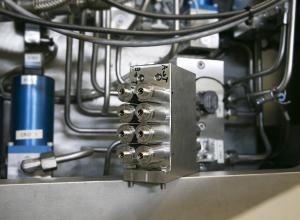R&D in Europe
Working with industry on digital hydraulics
15 Oct 2018
A contract signed with the European Domestic Agency is helping Finnish industry innovate in the domain of digital hydraulic valves. The result could interest ITER for use in its challenging remote maintenance environment.

This digital water hydraulic valve is the result of collaboration between the Tampere University of Technology, Fluiconnecto and Tamlink, with financial support from the European Domestic Agency, Fusion for Energy.
Once ITER is functioning in full power mode, it will be impossible to make changes, conduct inspections, or repair any of the Tokamak components in the activated areas other than by remote handling. Maintenance or repair activities on the 54 cassettes of the ITER divertor, for example, will be the responsibility of the divertor remote handling system under development now in Europe.
This will be a hydraulics-based system with one particularity—it will rely on water and not oil due to the constraints of ITER's nuclear environment, where a leakage of oil in the vessel would be a showstopper.
The European Domestic Agency has signed a contract with Finland's Tampere University of Technology (TUT) and Finnish companies Fluiconnecto and Tamlink to explore the development and testing of digital valves based on water hydraulics.
The solution under examination relies on a set of 16 small, digital on/off valves connected in parallel and controlled by computer to achieve the required performance—a solution that offers the advantage of not being vulnerable to the failure of a single valve. Trials—including hundreds of hours with a test load simulating the weight of an ITER divertor cassette—have also pointed to superior tracking accuracy and better resilience.
In the next phase of testing, the digital water hydraulic valves will be installed on the Divertor Test Platform (DTP2) environment in Tampere, Finland, where R&D on the installation/exchange of ITER's divertor cassettes was carried out for more than a decade.
Read the complete story on the European Domestic Agency website.
